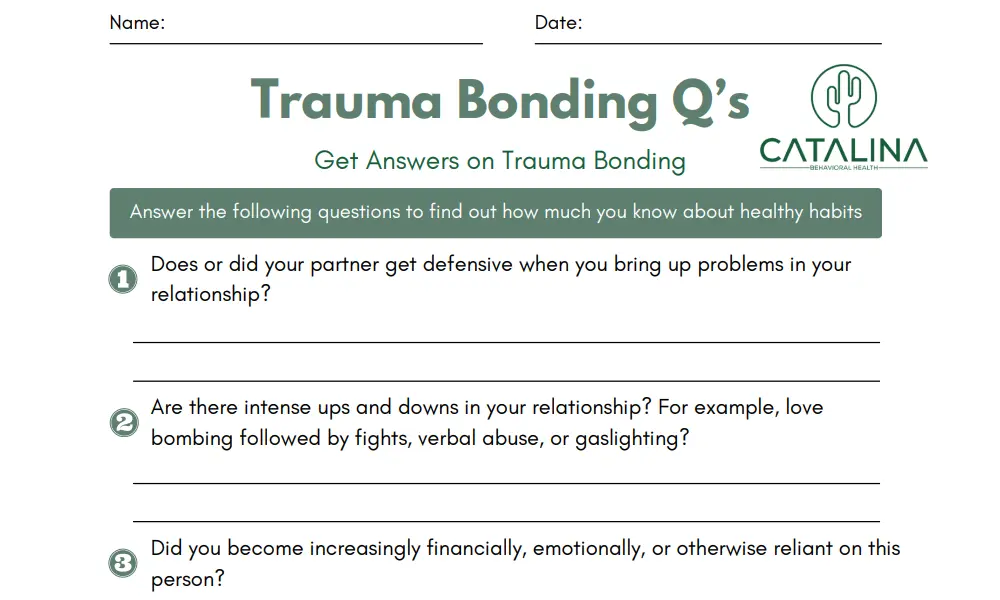Looking at Trauma Bonding and Effective Trauma Treatment
Trauma bonds can make it difficult to trust yourself, like yourself, or leave an abusive relationship of any kind. It is possible to experience trauma bonding in romantic relationships, familial relationships, or other types of relationships.
If you have found our resource, you are likely in pain, and wondering if trauma might be the cause.
But, what exactly is trauma bonding, and what are the 7 stages of trauma bonding?
Why is it so hard to detect a trauma bond, and how can the stages of trauma bonding set you up for an abusive relationship that’s hard to leave? Most importantly, if you identify that you’ve experienced trauma bonding in an abusive relationship, how do you recover from it?
Fortunately, the trauma-informed care we offer at Catalina can help. Today, we’ll define trauma bonding and discuss the seven stages of trauma bonding so that you can identify them. Then, we’ll go over the role these manipulation tactics play in abusive or toxic relationships, questions and a worksheet that can help you identify a trauma bond, and how our mental health and trauma treatment programs can help you overcome the effects of a trauma-bonded relationship.
Confidential Trauma and PTSD Assessment
What is Trauma Bonding?
Most people don’t know the true definition of trauma bonding. A trauma bond does not refer to bonding with someone over shared traumatic experiences or when a partner triggers your trauma. Instead, a trauma bond happens when an abuser uses tactics to bond with or get close to their target so that the abused person does not realize that they’re being abused, can’t leave, or feels like they can’t leave.
For example, people can experience trauma bonds in a cult, and individuals held hostage might develop a bond with the person keeping or attacking them to help them stay alive (often seen in Stockholm syndrome).
The seven stages of trauma bonding are often seen in cases of emotional abuse. Trauma bonding is designed to manipulate you and keep you from identifying abusive behavior.
The 7 Stages of Trauma Bonding

The seven stages of trauma bonding affect your psychology in a specific way that can set you up to enter or stay in an abusive relationship. These stages exist so that you won’t realize anything is wrong in an abusive relationship.
Whether you’re working to identify a past trauma bond or are currently in a relationship where you suspect trauma bonding, here are the seven stages of trauma bonding and how they can present.
1) The Love Bombing Stage
During the love bombing stage, you will likely feel that your relationship is going very well. Your partner may shower you with grandiose gifts, compliments, or hope regarding the future. For example, if you want a home and kids together, they might excitedly make plans for those things. The person will do anything to convince you that they have good intentions.
2) Trust and Dependency
The trust and dependency stage is the second stage of trauma bonding, but in some cases, it can be the first stage that indicates a problem. Still, this stage can be hard to detect. During the trust and dependency stage, an abusive partner is focused on ensuring that you trust them so that they can get away with treating you poorly later on.
To do this, they might continue attempting to prove to you that they’re trustworthy and start to “test” that trust. For example, your partner might get defensive if you question their loyalty, reliability, or behavior, even if something did happen.
A partner should be able to talk through problems with you. If your partner gets defensive, saying things like “don’t you trust me?” or shuts down your concerns, it is a red flag.
3) The Criticism Stage
During the criticism stage of trauma bonding, an abusive partner will start to criticize you if you speak up about being mistreated or ask to work on things. Your partner may say things like:
- You’re lying
- You’re exaggerating
- It’s not that bad
- We have a great relationship
- If you’d change, we’d have a great relationship
Depending on how sneaky an abusive partner is during the trust and dependency stage, this third stage could also be one of the first times you realize something’s amiss, and that your partner is beginning to foster unresolved trauma in your life. Or, if recognizing a trauma bond in a relationship, you might think back to this stage and realize that the behavior was wrong.
4) The Gaslighting Stage
Gaslighting is an abuse tactic where a person convinces you that you cannot trust your own experiences. Someone using gaslighting will often refuse to take accountability for their behavior; they may continue to use statements like those above. If you bring up an issue in your relationship, they might say that it “never happened,” justify the behavior (e.g., “I was trying to protect you” or “it’s for your own good”). You may start to question whether or not you can trust yourself.
This abuse tactic is often involved in betrayal trauma and can play a major role in trauma bonds and abusive relationships in general. Being told that you are wrong about having been mistreated can mean that you get used to the abuse or start to defend the abuser in your head (e.g., “They’d never hurt me; I’m awful for thinking so,” “I overreact,” “I’m bad,” or “I can’t trust myself.”) In some cases, an abused person can start to experience reactive abuse around this time.
Gaslighting is a manipulative behavior, and it can be part of why people stay in abusive relationships or can’t detect abusive behavior. An abusive person who uses gaslighting is actively setting you up to question yourself.
5) The Emotional Addiction Stage

During the emotional addiction stage, you may notice increased reliance on your partner, whether emotionally or tangibly. They may distance you from loved ones or further intertwine your lives in a way that makes it harder to leave the relationship.
Alternatively, or in conjunction, a partner may use love-bombing again during this stage of trauma bonding. You might get addicted to the “good times” in a relationship and crave those moments. In some cases, your desire for the “good times” can be why you stop speaking up, thinking that if you behave in a way that won’t upset your partner, you’ll have a “good relationship’ ‘ all of the time or more often.
6) Loss of Self
Many people who are in or have left abusive relationships do not feel or seem like their usual selves. Like the other stages of trauma bonding, this is not your fault. Due to a lack of boundaries in the relationship or questioning your own reality because of the relationship, many people experience it themselves. Your sense of self can be re-discovered, and you can re-instill healthy boundaries and self-confidence through treatment.
7) Resignation and Submission
During the resignation and submission stage, you are deep into a toxic or abusive relationship. You no longer question your partner or try to bring up problems, and this apathy is a form of trauma response. You may become resigned to their behavior due to gaslighting (for example you might believe that you are “the problem,”) or you might stop speaking up and submit to your partner because you fear escalation. You don’t want to upset them, make them mad, or be on the receiving end of emotional or physical abuse.
The Role of Trauma Bonding in an Abusive Relationship
Simply put, the stages of trauma bonding set you up to stay in an abusive situation through emotional attachment and abuse tactics. It’s possible to break trauma bonds, and it’s possible to overcome both the short and long-term mental health symptoms and challenges that can occur as the result of an abusive or toxic relationship.
Once you notice or suspect that you have been through the trauma bonding stages listed above, professional help matters.
Our Worksheet for Identifying Trauma Bonds

DOWNLOAD Trauma Bonding Worksheet PDF
Whether you are currently experiencing psychological abuse or are processing past abuse that occurred in a trauma bond, knowing how to identify it is crucial. For those questioning themselves, it can also be very validating. Here are some questions that can help you identify a trauma bond relationship.
- Does or did your partner get defensive when you bring up problems in your relationship?
- Are there intense ups and downs in your relationship? For example, love bombing followed by fights, verbal abuse, or gaslighting?
- Do you or did you struggle to leave a relationship because you crave “the good times”? Alternatively, do or did you become increasingly financially, emotionally, or otherwise reliant on this person or entity?
- Do you or did you notice a decrease in your sense of self, self esteem, or ability to trust that your experiences are real?
- Do you or did you experience emotional withdrawals (e.g., missing the abusive person or toxic relationship) upon leaving? Alternatively, did these strong cravings for the person or relationship make it difficult to leave?
- Did you experience gaslighting, criticism, or threats? Alternatively, were you made to feel as though you were or are “nothing” or “less than” without this person or relationship — that you were incapable on your own?
The relational and emotional trauma that happens when trauma bonding occurs can lead to long-term mental health consequences and symptoms. That said, it’s possible for people who have been in this abusive situation to heal.
Get Effective Trauma Treatment Options
Life After a Trauma Bond: How Treatment Can Help
Our trauma therapy and treatment programs can help you overcome the impacts of an abusive or toxic relationship. Here are some of the ways that treatment can help you overcome the consequences of the abusive cycle presented in a trauma-bond relationship.
Learning that the way your partner treated you is wrong.
People who have experienced emotional, physical, or sexual abuse (including trauma bonds) often question themselves. Sometimes, you’ll still question yourself after you leave. Trauma treatment will help you understand that the way you were treated is not okay; not just on the surface, but on a deeper level.
Developing new boundaries or communication skills and self-esteem.
People who have been through emotional abuse can have trouble establishing personal boundaries. Treatment can help you understand how to build and maintain a healthy relationship and understand how healthy relationships differ from overly intertwined, abusive, or toxic relationships. Self-confidence and self-esteem-building exercises can also be a part of treatment.
Evidence-based trauma therapies.
The physical and mental health effects of trauma are real. You might experience new or worsened symptoms of post-traumatic stress disorder, anxiety, or depression following an abusive relationship. Trauma treatment helps your nervous system heal and can support your overall physical, emotional, psychological, and social health long-term.
Self-care techniques and routines.
Self-care practices can play a role in effective trauma treatment and healing as well as overall health. With a mental health professional, you can learn to identify and work through trauma responses, establish routines that support your physical and mental health, trust yourself, and find coping strategies to help you through tough moments or mental health symptoms like feelings of depression.
Get Help for Trauma From Abusive Relationships at Catalina Behavioral Health

Breaking free from a trauma bond and its effects is possible. Catalina Behavioral Health offers various levels of mental health treatment, including inpatient and outpatient treatment programs.
To learn more about treatment or schedule a tour of our facility, call Catalina Behavioral Health’s admissions line today. We’re here to verify your insurance, answer questions about treatment, and help you or your loved one achieve lasting recovery from trauma.
All calls are confidential, so please reach out for our support now!
Up To 100% of Rehab Costs Covered By Insurance
FAQs Regarding the 7 Stages of Trauma Bonding
What are the withdrawal symptoms of a trauma bond?
Abusive relationships can lead to patterns of emotional addiction. You may feel addicted to the person or relationship. In turn, you can have emotional withdrawals when leaving a trauma bond. Symptoms you experience during that time can include but aren’t limited to missing the person or relationship, feelings of depression, emptiness, or hopelessness, anxiety, guilt and self-blame, hypervigilance, or nightmares, memories of the relationship, or flashbacks.
How can you break a trauma bond?
To break a trauma bond, you must leave the relationship and work to heal from it. Although trauma bonds set you up to believe that you can’t leave, or that your relationship has deep love and passion that you don’t want to leave, there is a better life on the other side.
In an abusive relationship, a partner will often try to prevent you from leaving. It’s unfortunately true that it’s often dangerous to leave abusive relationships.
The National Domestic Violence Hotline has safety planning resources that can help you break free from a trauma bond or leave an otherwise abusive relationship safely.
What does a trauma bond feel like?
Any relationship involving trauma bonding will feel deeply interconnected. Often, this will intensify as the relationship progresses; by the time you realize that there’s a problem or that you need to leave, you might be so connected to the person or entity (e.g., a cult) that it’s difficult to leave for reasons such as financial dependence, emotional addiction, or fear of the threats, violence, or outbursts that could ensue if you try to leave.
How does a trauma bond start?
Trauma bonds start with the love-bombing stage. When the relationship began, it may have felt perfect or electric. The person might have showered you with gifts, affection, and promises. They may even have tried to win over other people in your life.
The love bombing stage exists for the purpose of psychological manipulation. It is to skew the victim’s emotions and ability to identify poor treatment later on.
Any abusive dynamic is not the fault of the victim. While breaking a trauma bond is hard, it is possible. Professional support can help you overcome the effects of being on the receiving end of abusive behavior.





